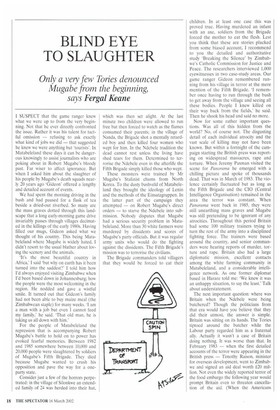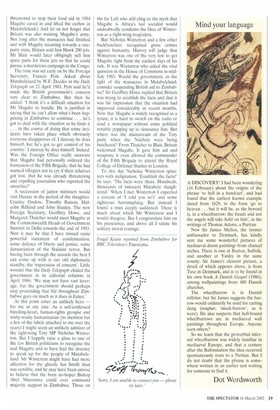BLIND EYE TO SLAUGHTER
Only a vety few Tories denounced Mugabe from the beginning,
says Fergal Keane I SUSPECT that the game ranger knew what we were up to from the very beginning. Not that he ever directly confronted the issue. Rather it was his talent for tactful omission — refusing to ask exactly what kind of jobs we did — that suggested he knew we were anything but 'tourists'. In Matabeleland these days it can be dangerous knowingly to assist journalists who are poking about in Robert Mugabe's bloody past. Far wiser to affect ignorance. But when I asked him about the slaughter of his people by Mugabe's death squads nearly 20 years ago 'Gideon' offered a lengthy and detailed account of events.
We had spent the morning driving in the bush and had paused for a flask of tea beside a dried-out riverbed. So many are the mass graves dotted through this landscape that a long early-morning game drive invariably passes through villages decimated in the killings of the early 1980s. Having filled our mugs, Gideon asked what we thought of his country. This being Matabeleland where Mugabe is widely hated, I didn't resort to the usual blather about loving the scenery and the animals.
'It's the most beautiful country in Africa,' I said tut why on earth has it been turned into the saddest?' I told him how I'd always enjoyed visiting Zimbabwe when I'd been based down in Johannesburg; how the people were the most welcoming in the region. He nodded and gave a wistful smile. It turned out that Gideon's family had not been able to buy maize meal (the Zimbabwean staple) for many weeks. 'I am a man with a job but even I cannot feed my family.' he said. 'That old man, he is taking us all down with him.'
For the people of Matabeleland the repression that is accompanying Robert Mugabe's battle to hold on to power has evoked fearful memories. Between 1982 and 1985 somewhere between 10,000 and 20,000 people were slaughtered by soldiers of Mugabe's Fifth Brigade. They died because Mugabe wanted to crush his opposition and pave the way for a oneparty state.
Consider just a few of the horrors perpetrated: in the village of Silonkwe an extended family of 24 was herded into their hut, which was then set alight. At the last minute two children were allowed to run free but then forced to watch as the flames consumed their parents; in the village of Nanda, the Brigade shot a mentally retarded boy and then killed four women who wept for him. In the Ndebele tradition the dead cannot rest unless the living have shed tears for them. Determined to terrorise the Ndebele even in the afterlife the Fifth Brigade simply killed those who wept.
These monsters were trained by Mr Mugabe's Stalinist chums from North Korea. To the dusty bushveld of Matabeleland they brought the ideology of Lenin and the methods of the Einsatzgruppen. In the latter part of the campaign they attempted — on Robert Mugabe's direct orders — to starve the Ndebele into submission. Nobody disputes that Mugabe had a serious security problem in Matabeleland. More than 30 white farmers were murdered by dissidents and scores of Mugabe's party officials. But it was regular army units who would do the fighting against the dissidents. The Fifth Brigade's mission was to terrorise the civilians.
The Brigade commanders told villagers that they would be forced to eat their children. In at least one case this was proved true. Having murdered an infant with an axe, soldiers from the Brigade forced the mother to eat the flesh. Lest you think that these are stories plucked from some biased account, I recommend to you the detailed and authoritative study 'Breaking the Silence' by Zimbabwe's Catholic Commission for Justice and Peace. The researchers interviewed 1,000 eyewitnesses in two case-study areas. Our game ranger Gideon remembered running from his village in terror at the mere mention of the Fifth Brigade. 'I remember once having to run through the bush to get away from the village and seeing all these bodies. People I knew killed on their way back from the fields,' he said. Then he shook his head and said no more.
Now for some rather important questions. Was all of this hidden from the world? No, of course not. The disgusting detail of each individual atrocity and the vast scale of killing may not have been known. But within a fortnight of the campaign starting the British press was reporting on widespread massacres, rape and torture. When Jeremy Paxman visited the scene for Panorama he emerged with a chilling picture and spoke of thousands dead. That was in March of 1983. The violence certainly fluctuated but as long as the Fifth Brigade and the CIO (Central Intelligence Organisation) remained in the area the terror was constant. When Panorama went back in 1985, they were still unearthing mass graves and Mugabe was still pretending to be ignorant of any atrocities. Throughout this period Britain had some 100 military trainers trying to turn the rest of the army into a disciplined fighting force. The trainers were based around the country, and senior commanders were hearing reports of murder, torture and rape. Britain also had a large diplomatic mission, excellent contacts among the white farming community in Matabeleland, and a considerable intelligence network. As one former diplomat based in Harare told me: 'We knew it was an unhappy situation, to say the least.' Talk about understatement.
The next important question: where was Britain when the Ndebele were being butchered? Though the politicians from that era would have you believe that they did their utmost, the answer is simple. Britain was sitting on its hands. The Tories tiptoed around the butcher while the Labour party regarded him as a fraternal ally. Actually it wasn't a case of Britain doing nothing. It was worse than that. In February 1983 — when the first detailed accounts of the terror were appearing in the British press — Timothy Raison, minister for overseas development, went to Zimbabwe and signed an aid deal worth £20 million. Not even the widely reported terror of the food embargo the following year would prompt Britain even to threaten cancellation of the aid. (When the Americans threatened to stop their food aid in 1984 Mugabe caved in and lifted the curfew in Matabeleland.) And let us not forget that Britain was also training Mugabe's army. Not long after the massacres had finished and with Mugabe steaming towards a oneparty state. Britain sold him Hawk 200 jets. Mr Blair would later obligingly sell him spare parts for these jets so that he could pursue a murderous campaign in the Congo.
The tone was set early on by the Foreign Secretary. Francis Pym. Asked about Matabeleland by W.F. Deedes in the Daily Telegraph on 21 April 1983, Pym said he'd made the British government's concern very clear to Zimbabwe. But then he added: 'I think it's a difficult situation for Mr Mugabe to handle. He is justified in saying that he can't allow what's been happening in Zimbabwe to continue . . . he's got to deal with the situation as he finds it . . . in the course of doing that some incidents have taken place which obviously everyone disapproves of. I daresay he does himself, but he's got to get control of his country.' I daresay he does himself. Indeed. Was the Foreign Office really unaware that Mugabe had personally ordered the formation of the Fifth Brigade, that he had warned villagers not to cry if their relatives got lost, that he was already threatening and expelling journalists who reported the atrocities?
A succession of junior ministers would visit Harare in the period of the slaughter. Cranley Onslow, Timothy Raison, Malcolm Rifkind and John Stanley. The new Foreign Secretary, Geoffrey Howe, and Margaret Thatcher would meet Mugabe at the Commonwealth Heads of Government Summit in Delhi towards the end of 1983. Now it may be that I have missed some powerful statement of condemnation, some defence of liberty and justice, some denunciation of the Stalinist terror. But having been through the records the best I can come up with is our old diplomatic standby, the 'expression of concern'. Little wonder that the Daily Telegraph chided the government in its editorial columns in April 1984: 'We may not have vast leverage, but the government should perhaps stop pretending that life throughout Zimbabwe goes on much as it does in Esher.'
At this point enter an unlikely hero — for me at any rate. As a self-confessed bleeding-heart, human-rights groupie and wishy-washy humanitarian (to mention but a few of the labels attached to me over the years) I might seem an unlikely admirer of the right-wing Tory MP Nicholas Winterton. But I happily raise a glass to one of the few British politicians to recognise the real Mugabe and to have had the decency to speak up for the people of Matabeleland. Mr Winterton might have had more affection for the ghastly Ian Smith than was sensible, and he may have been unwise to believe that the born no-hoper Bishop Abel Muzorewa could ever command majority support in Zimbabwe. Those on the far Left who still cling to the myth that Mugabe is Africa's last socialist would undoubtedly condemn the likes of Winterton as a right-wing troglodyte.
But Nicholas Winterton and a few other backbenchers recognised gross crimes against humanity. History will judge that Winterton was one of the very few to get Mugabe right from the earliest days of his rule. It was Winterton who asked the vital question in the House of Commons in midJuly 1983. Would the government, in the light of the massacres in Matabeleland, consider suspending British aid to Zimbabwe? Sir Geoffrey Howe replied that Britain was trying to establish the facts and that it was his impression that the situation had improved considerably in recent months. Now that Mugabe is widely recognised as a tyrant, it is hard to switch on the radio or read a newspaper without some political notable popping up to denounce him. But where was the mainstream of the Tory party when the Ndebele were being butchered? From Thatcher to Blair, Britain welcomed Mugabe. It gave him aid and weapons; it even allowed the commander of the Fifth Brigade to attend the Royal College of Defence Studies in London.
To this day Nicholas Winterton splutters with indignation. 'Establish the facts!' he says. 'The facts were there. Hundreds, thousands of innocent Matabele slaughtered.' When I met Winterton I expected a torrent of 'I told you so's' and some righteous harrumphing. But instead I found a man deeply saddened. There is much about which Mr Winterton and I would disagree. But I congratulate him on his prescience, and above all I salute his solitary moral courage.
Fergal Keane reported from Zimbabwe for BBC Television's Panorama

















































































 Previous page
Previous page